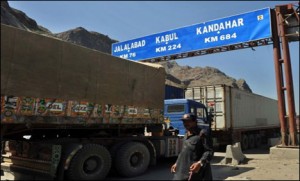By Ali Raza
According to the findings of an inquiry commission appointed by the Supreme Court of Pakistan, undocumented revenue generated between Torkham border, Bara and hawala/hundi market of Chowk Yadgar—the main crossing point between Afghanistan and Pakistan— stands at between Rs5 and Rs6 billion per month.
Although the report`s findings are controversial, mainly because some members of the commission disagree with the figures. But what is not controversial is that the volume of the undocumented trade taking place at the overland crossing is very large and growing every year.
The report said illegal trade from Torkham border alone was between Rs100m and Rs150m per day. The Asian Development Bank`s Integrated Border Immigration System was still in the pipeline since 2002 and only one or two meetings had taken place so far. There are two vehicle passes and 14 mule passes into Pakistan in Khyber Agency. The vehicle passes are Torkham and Shalman which is 15km east of Torkham.
According to an estimate produced a few years ago, the size of the undocumented trade at Torkham, and other crossing points in its vicinity, was $2.5bn per year. Today, those involved with drawing up that estimate say the figure could be larger than $4.5bn.
 Clearly, burgeoning regional trade flows are pushing very hard against the myriad obstacles in their path. These obstacles include infrastructure deficiencies, a policy framework that is stacked against freer trade with our neighbouring countries, and security related considerations. In short, Pakistan`s neglect of its overland trade potential with its neighbours over the years has pushed the burgeoning trade energies into the margins.
Clearly, burgeoning regional trade flows are pushing very hard against the myriad obstacles in their path. These obstacles include infrastructure deficiencies, a policy framework that is stacked against freer trade with our neighbouring countries, and security related considerations. In short, Pakistan`s neglect of its overland trade potential with its neighbours over the years has pushed the burgeoning trade energies into the margins.
In this situation, trade continues but without the accompanying benefits to the state of using business relations to build better ties and to reap a revenue windfall in the process. This is a rather sad reflection of the harm that short-sighted thinking can do. Viewing is neighbours through a lens that is dominated by geopolitical considerations is giving Pakistan the worst of both worlds. It is depriving it of the benefits that closer economic ties can bring to the country, while pushing trade energies into a domain where racketeers thrive and the state is little more than a hapless spectator to a chaotic and uncontrolled expansion in undocumented cross-border trade.
Blaming mis-management and the lack of facilities available on the border, the report goes on to say that Federal Investigation Agency (FIA) was not keeping record of people whether Pakistanis or foreigners entering or leaving Pakistan and FIA`s arrival and departure booths were equipped with passport scanning machines, a camera and computer connected with the interior ministry data bank but no biometric machines were available.
Similarly the customs officials at Torkham border only perform cargo clearance activity on a daily basis where approximately 800 to 1,000 cargo carrying vehicles cross the border in either direction. But there is no dedicated yard for parking of vehicles, no vehicle scanning machine, no cargo handling equipment, there is an acute shortage of staff, luggage scanners, storage facility and no arrangement for security of personnel and cargo.
In its order the court noted that 5,000 to 30,000 people crossed border every day but since there was no record, it was difficult to identify how many of them were drug-traffickers or terrorists. Since no record of the passengers travelling without valid documents is kept, their numbers are based on estimates. It has been observed that most of the pedestrian traffic (around 99%) cross border without any documentation, the report stated. The court was also informed that the UNHCR, in its report published in 2009 mentioned that around 50,000 persons cross the Torkham border every day. However, the higher numbers previously were due to heavy movement of Afghan refugees.





















